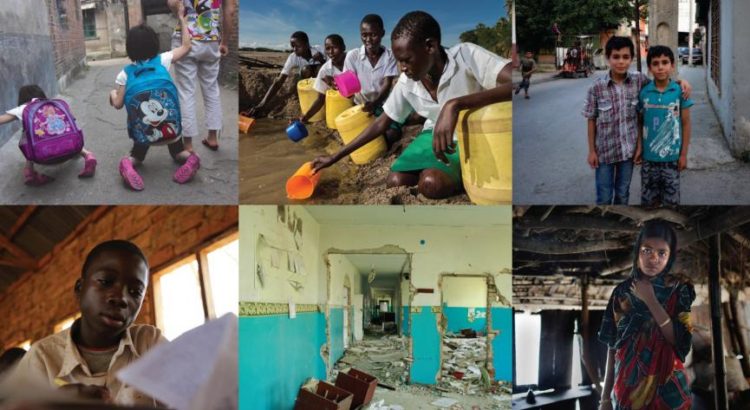China/09 de Junio de 2016/Xinhua Español
Naciones Unidas publicó hoy un importante análisis de las prácticas de suministro de comidas escolares a nivel mundial que ofrece orientación sobre la forma de diseñar e implementar a gran escala los programas nacionales de comidas escolares sostenibles que puedan cumplir los estándares aprobados a nivel mundial.
El análisis documentó y analizó una serie de programas de comidas escolares encabezados por gobiernos para brindar a los encargados de tomar decisiones y a los profesionales de todo el mundo el conocimiento, la evidencia y las buenas prácticas que necesitan para reforzar sus esfuerzos nacionales de alimentación escolar.
Elaborado por la Asociación para el Desarrollo Infantil del Imperial College de Londres, el Programa Mundial de Alimentos (PMA) y el Banco Mundial, el «Libro de Consulta de Alimentación Escolar Mundial: Lecciones de 14 países» fue creado en respuesta a la demanda de los gobiernos y socios de desarrollo, indicaron funcionarios de la ONU.
Los 14 países son Botswana, Brasil, Cabo Verde, Chile, Cote d’Ivoire, Ecuador, Ghana, India, Kenia, Mali, México, Namibia, Nigeria y Sudáfrica.
Los programas de alimentación escolar fueron definidos por el Banco Mundial como «redes de seguridad social específicas que brindan beneficios tanto educativos como de salud a los niños más vulnerables, lo que incrementa las tasas de inscripción, reduce el absentismo y mejora la seguridad alimentaria a nivel familiar».
Más allá de la mejoría en el acceso a los alimentos, los programas de comidas escolares también tienen un efecto positivo en el estatus nutricional, la equidad de género y el estatus educativo, cada uno de los cuales contribuye a mejorar en general los niveles de desarrollo humano y del país.
Con la capacidad demostrada de las comidas escolares para mejorar la salud y la educación de los niños, además de apoyar las economías locales y nacionales y la seguridad alimentaria, el PMA informó que los programas de alimentación escolar existen en la mayoría de los países del mundo con datos disponibles, con una inversión anual mundial total de 75.000 millones de dólares.
Esto proporciona todos los días a cerca de 368 millones de niños, uno de cada cinco, una comida en la escuela. Sin embargo, muy a menudo, tales programas son más débiles en los países donde más se necesitan, advirtió la agencia de la ONU.
Con la colaboración de alto nivel de equipos de los gobiernos de estos 14 países, el libro de consulta incluyó una compilación de estudios de casos integrales y concisos por país. El libro resaltó los beneficios asociados con modelos alternativos de alimentación escolar y analizó temas, tendencias y desafíos generales relacionados con ellos.
En un prólogo conjunto, el presidente del Grupo del Banco Mundial, Jim Yong Kim, y la directora ejecutiva del PMA, Ertharin Cousin, indicaron que la investigación mostró la forma en la que los programas de comidas escolares ayudan a llevar y mantener a los niños en el salón de clases, «lo que contribuye a su aprendizaje evitando el hambre y ampliando las capacidades cognitivas».
«Actualmente, los programas nacionales de alimentación escolar están cada vez más insertos en la política nacional de eliminación de la pobreza, protección social, educación y nutrición», indicaron.
Por otra parte, la editora en jefe y directora ejecutiva de la Asociación para el Desarrollo Infantil, Lesley Drake, dijo que el mensaje general de esta investigación es que «no existe un modelo único» para los programas de alimentación escolar y que hay muchas rutas hacia el éxito.
«El contexto es la clave», señaló, «Este libro de consulta actuará como una valiosa herramienta para que los gobiernos puedan tomar decisiones basadas en evidencias que mejoren la efectividad de sus programas de alimentación escolar».
El libro de consulta sigue a otros dos llamados Replanteando la Alimentación Escolar y el Estado de la Alimentación Escolar Mundial como el tercero de una trilogía de análisis de definición de agenda producidos por la asociación mundial del Banco Mundial, el PMA y la Asociación para el Desarrollo Infantil.
Según informes, estos análisis han dado forma a la manera en la que los gobiernos y los donadores por igual analizan la alimentación escolar.
«Ayudar a los países a aplicar este conocimiento (del libro de consulta) para reforzar los programas nacionales de comidas escolares contribuirá a reducir la vulnerabilidad de los más pobres y dará a todos los niños una oportunidad para ser educados, para tener un futuro brillante y para eliminar la pobreza», dijeron Kim y Cousin.
Aunque las comidas escolares son ofrecidas por la mayoría de los gobiernos de los países de ingresos medios y altos de todo el mundo, los niños que podrían beneficiarse más con los programas de alimentación escolar se encuentran en los países de bajos ingresos que carecen de comidas escolares suministradas por los gobiernos, se informó.
De acuerdo con el PMA, 66 millones de niños en edad de asistir a la escuela primaria pasan hambre todos los días, 23 millones de los cuales están en Africa. Además, el 80 por ciento de estos 66 millones de niños se concentran en apenas 20 países.
Además, 75 millones de niños en edad escolar, el 55 por ciento de ellos mujeres, no asisten a la escuela y el 47 por ciento vive en Africa subsahariana. Por consiguiente, la necesidad de reducir el hambre y de incrementar la inscripción escolar de estos niños es evidente y los programas de alimentación escolar se han desarrollado para atender este problema polifacético.
Las escuelas se han convertido en un escenario natural y adecuado para la implementación de las intervenciones de salud y educación. La alimentación escolar es sólo una de las facetas de las iniciativas de salud escolar y otros programas podrían incluir la desparasitación, la prevención del VIH/Sida y la educación en habilidades de vida y salud.
En general, se ha demostrado que los programas de alimentación escolar incrementan directamente el estatus educativo y nutricional de los niños receptores e impactan de manera indirecta la vida económica y social de la familia y del propio niño.
Fuente: http://spanish.xinhuanet.com/2016-06/10/c_135425546.htm














 Users Today : 7
Users Today : 7 Total Users : 35460937
Total Users : 35460937 Views Today : 20
Views Today : 20 Total views : 3420307
Total views : 3420307